人教课标版高中英语选修8Unit 2 Cloning Inversion倒装课件 (共41张)
文档属性
| 名称 | 人教课标版高中英语选修8Unit 2 Cloning Inversion倒装课件 (共41张) | 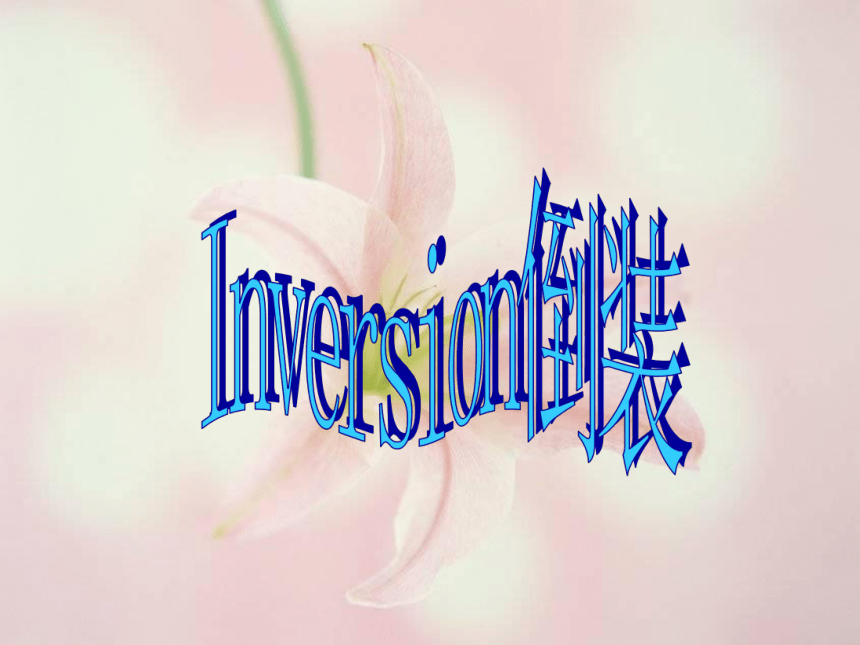 | |
| 格式 | zip | ||
| 文件大小 | 4.6MB | ||
| 资源类型 | 教案 | ||
| 版本资源 | 人教版(新课程标准) | ||
| 科目 | 英语 | ||
| 更新时间 | 2019-05-26 22:51:17 | ||
图片预览

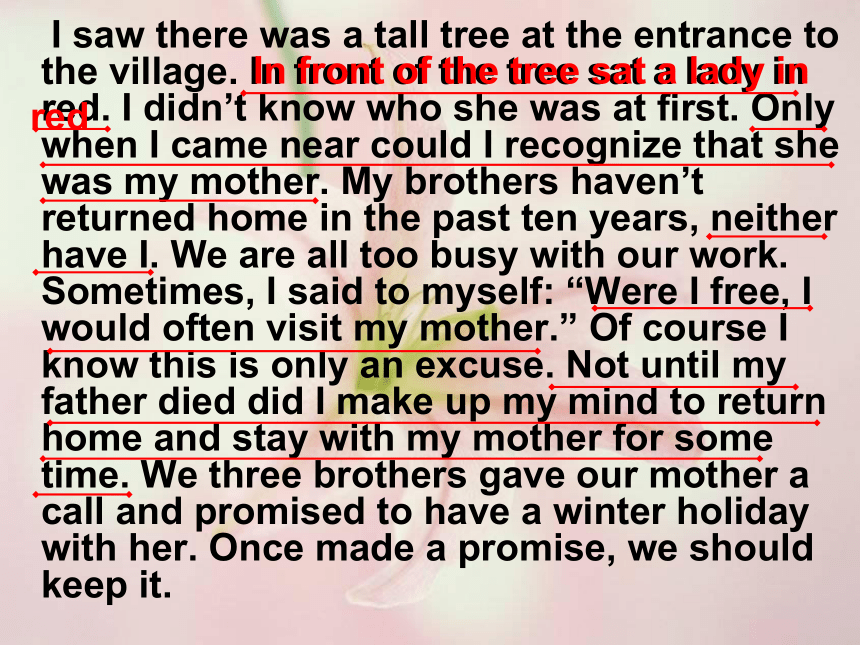
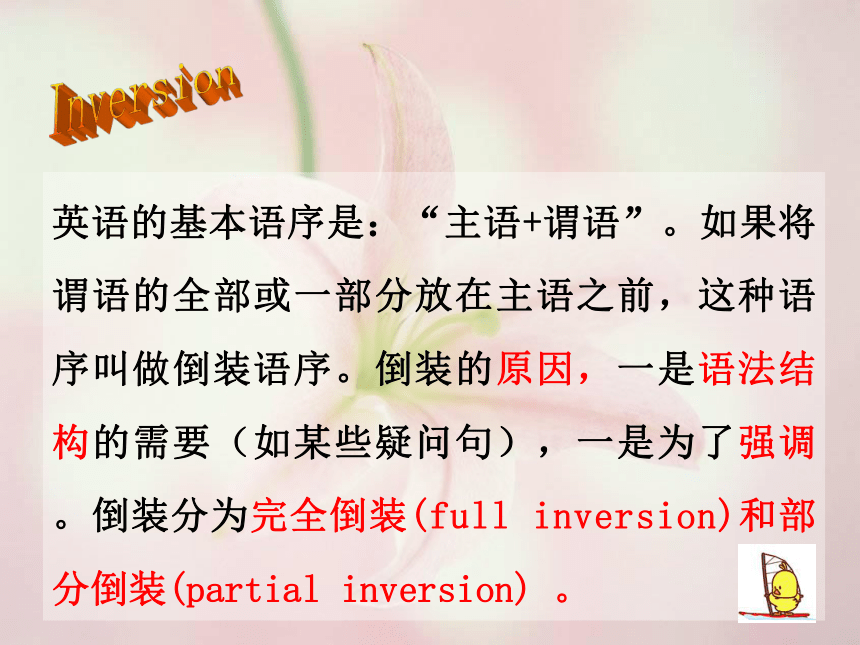
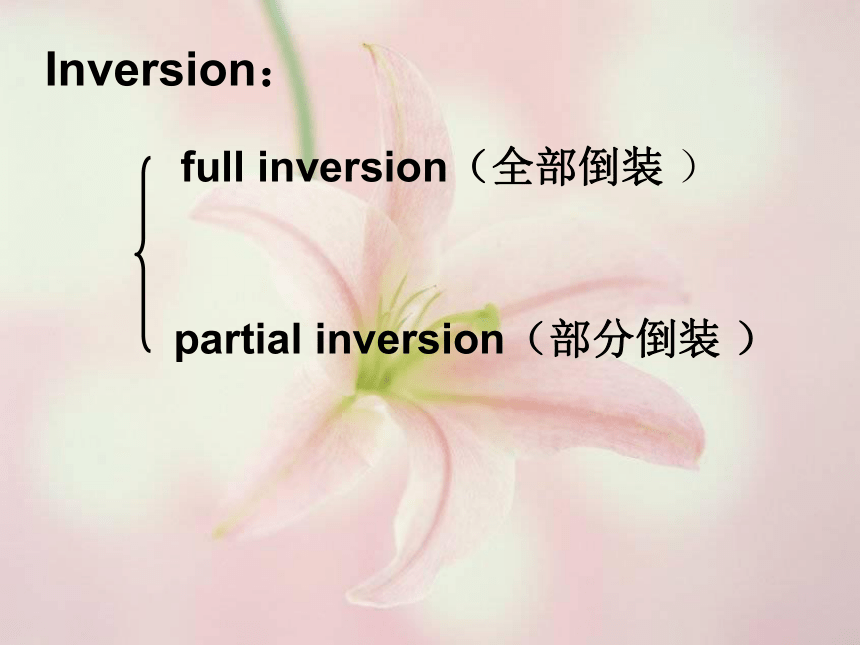
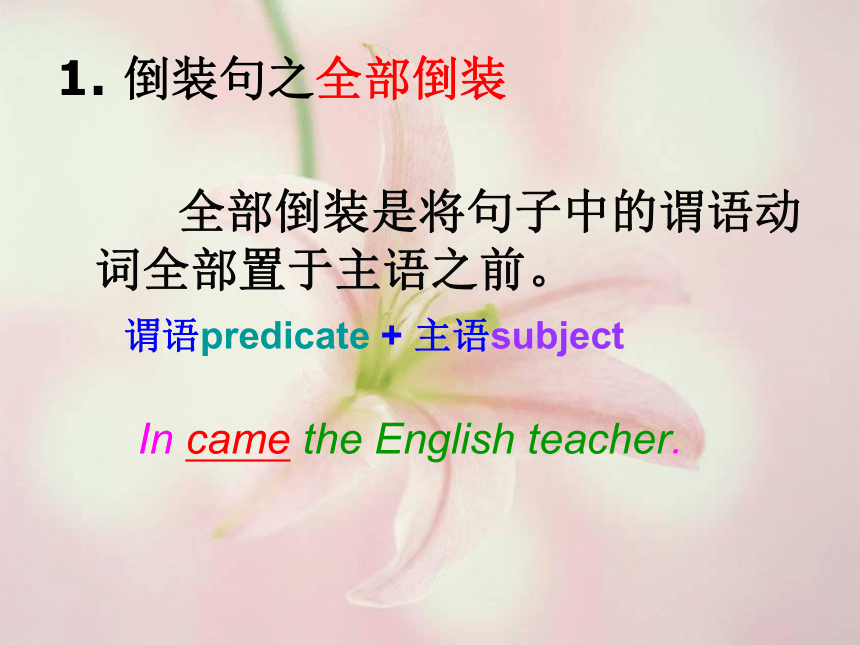
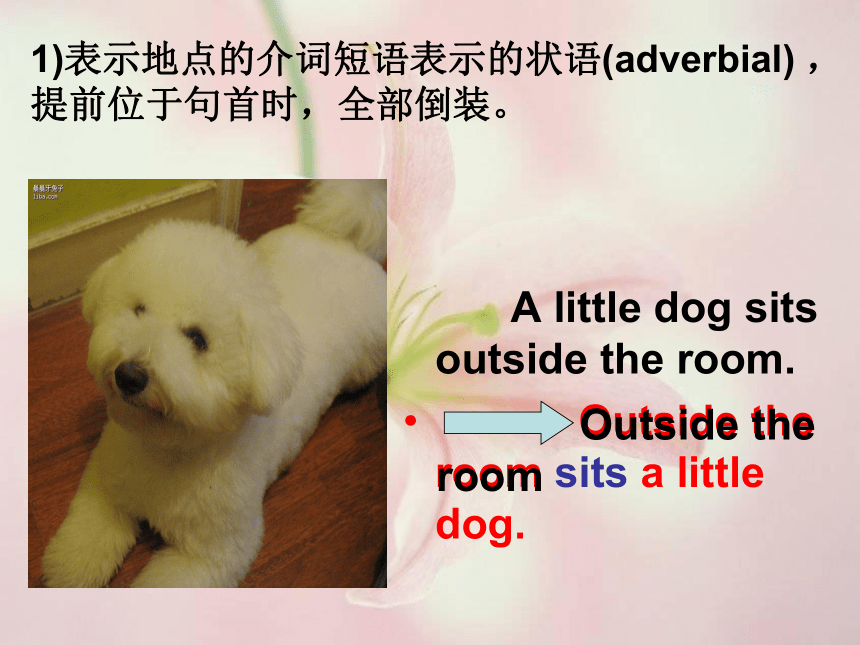

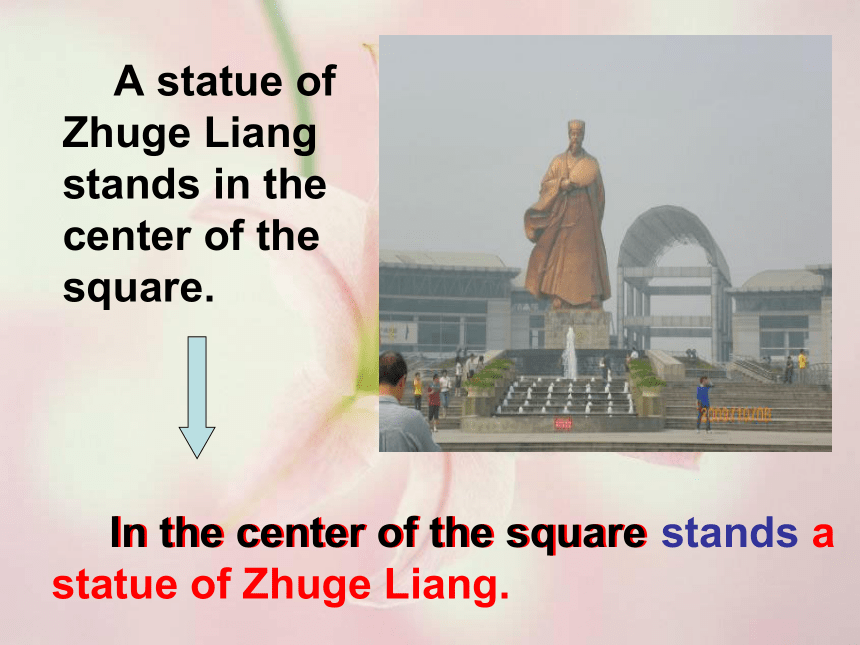
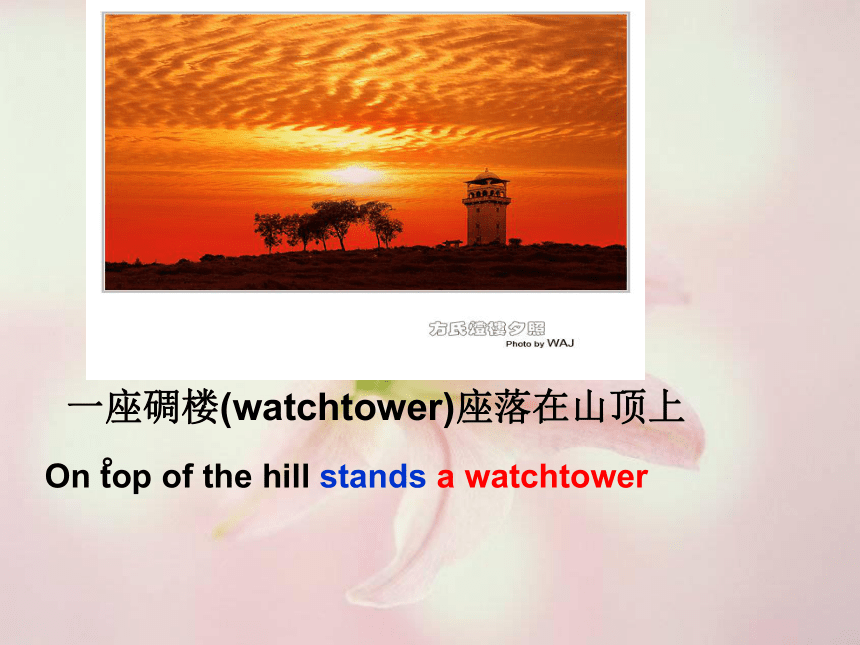
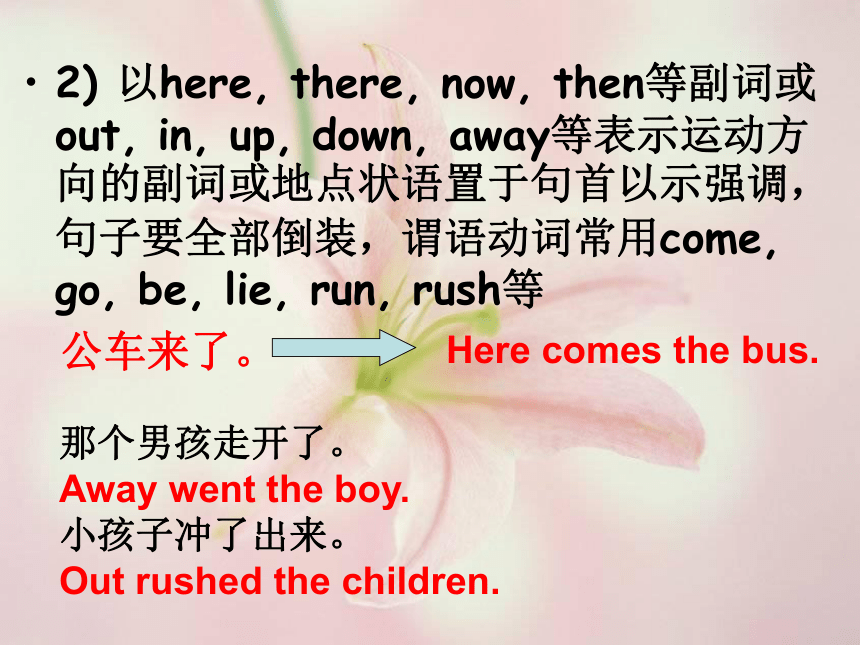
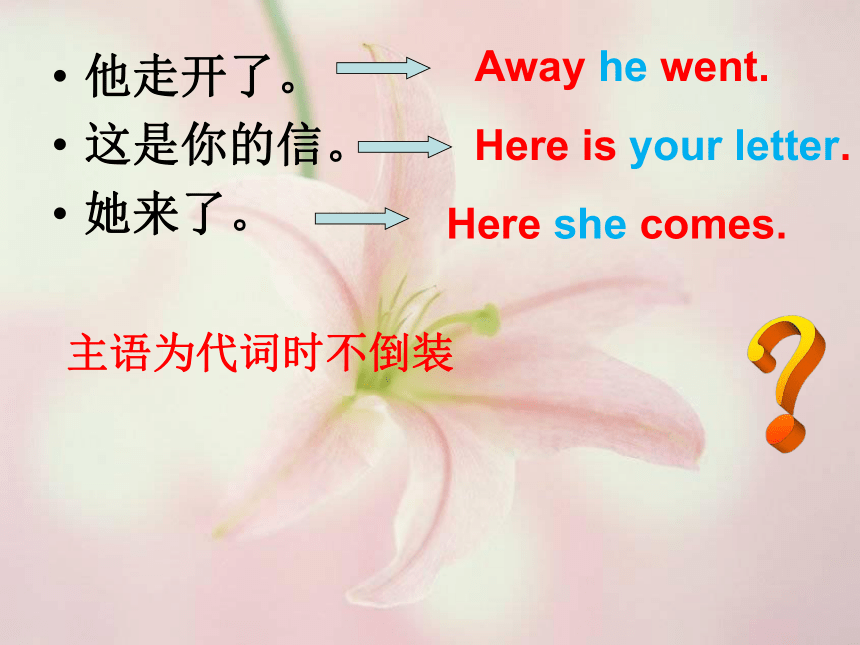
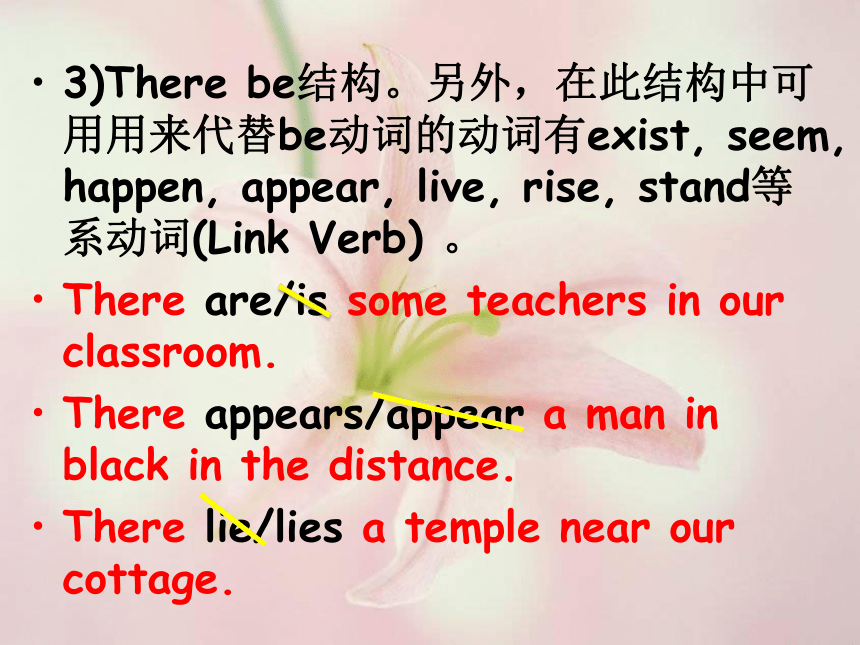
文档简介
课件41张PPT。Inversion倒装 I saw there was a tall tree at the entrance to the village. In front of the tree sat a lady in red. I didn’t know who she was at first. Only when I came near could I recognize that she was my mother. My brothers haven’t returned home in the past ten years, neither have I. We are all too busy with our work. Sometimes, I said to myself: “Were I free, I would often visit my mother.” Of course I know this is only an excuse. Not until my father died did I make up my mind to return home and stay with my mother for some time. We three brothers gave our mother a call and promised to have a winter holiday with her. Once made a promise, we should keep it.
In front of the tree sat a lady in
red英语的基本语序是:“主语+谓语”。如果将谓语的全部或一部分放在主语之前,这种语序叫做倒装语序。倒装的原因,一是语法结构的需要(如某些疑问句),一是为了强调。倒装分为完全倒装(full inversion)和部分倒装(partial inversion) 。Inversionfull inversion(全部倒装 )partial inversion(部分倒装 )Inversion: 谓语predicate + 主语subject 全部倒装是将句子中的谓语动
词全部置于主语之前。1. 倒装句之全部倒装In came the English teacher.
A little dog sits outside the room.
Outside the room sits a little dog. Outside the
room1)表示地点的介词短语表示的状语(adverbial) ,
提前位于句首时,全部倒装。
A piece of beautiful music came from the valley.
From the valley came a piece of beautiful music .
From the valley A statue of Zhuge Liang stands in the center of the square. In the center of the square stands a statue of Zhuge Liang.In the center of the square一座碉楼(watchtower)座落在山顶上。
On top of the hill stands a watchtower2) 以here, there, now, then等副词或 out, in, up, down, away等表示运动方向的副词或地点状语置于句首以示强调,句子要全部倒装,谓语动词常用come, go, be, lie, run, rush等
公车来了。Here comes the bus.那个男孩走开了。
Away went the boy.
小孩子冲了出来。
Out rushed the children.他走开了。
这是你的信。
她来了。Here is your letter.Away he went.Here she comes.?主语为代词时不倒装3)There be结构。另外,在此结构中可用用来代替be动词的动词有exist, seem, happen, appear, live, rise, stand等系动词(Link Verb) 。
There are/is some teachers in our classroom.
There appears/appear a man in black in the distance.
There lie/lies a temple near our cottage.开平现存很多座碉楼。(exist)
There exist many watchtowers in Kaiping.
4)表语(predicative)置于句首时,为了使上下文紧密衔接,常把表语放在句首,倒装结构为:
表语+连系动词+主语
Mr. Huang, Miss Zhang and other guests are present at the party.
Present at the party are Mr. Huang, Miss Zhang and other guests.
The days when Chinese were looked down upon are gone.
Gone are the days when Chinese were looked down upon.The soldiers ran to the mountain, on the top of___________________.
(飘扬着国旗)(flow) which flew a flag_______________________(坐在前排)were some famous stars. (seat)Seated in the front row2. 倒装句之部分倒装 部分倒装是指将谓语的一部分如be动词,情态倒装或助动词至主语之前。Never will I forget you.+主语 + v.…助动词/情态动词1) Only修饰副词,介词短语或状语从句放在句首时,主句要进行部分倒装。
只有到了那个时候,他才知道知识的重要性。
Only then did he know the importance of knowledge.
只有我们自己才能拯救自己。
Only we ourselves can save ourselves.
?Only 修饰主语时不倒装2)把副词so放在句首,表示前面所说的情况,也适合于另一人或物。肯定句用so,否定句用neither/nor,句式如下:So/ Neither (Nor)+ be (have,助动词或情态动词)+主语。他喜欢读书,我也是.
He likes reading very much. So do I .
我从来没有去过广州大学,他也是.
I have never been to Guangzhou University, and neither/ nor has he.
3)句首为否定的词或含有否定意义的短语时,如few, little, never, not, not until, nowhere, rarely, seldom, hardly/scarcely…when…, no sooner…(than)…, not only…(but also), at no time, by no means … 等。
他一点也不关心自己的安全.
He cared little about his own safety.
Little did he care about his own safety.
我很少去看电影.
I seldom go to the cinema.
Seldom do I go to the cinema.我从来没有看过这样的表演.
I have never seen such a performance.
Never have I seen such a performance.等到孩子睡着了,妈妈才离开房间.(not…until…)
The mother didn’t leave the room until the child fell asleep.
当Not until引出主从复合句,主句倒装,从句不倒装。Not until the child fell asleep did the mother leave the room. 他一进屋就开始下雨了。Hardly/scarcely…when… / No sooner…than…/
Hardly had he entered the house when it began to rain.
No sooner had they entered the house than it began to rain.
他不但学习好,而且他还乐于帮同学们解决学习问题.(not only…but also…)
Not only does he do well in his lessons, but also he often helps others with their lessons.
注意:not only…but also… 连接两个并列分句时,第一个分句应使用部分倒装。 不但你,我也喜欢在江边散步.
Not only you but also I am fond of taking a walk along the riverbank.注意:如果置于句首的Not only… but also仅连接两
个并列词语,不可用倒装结构。?4. as, though 引导的倒装句as / though引导的让步状语从句必须将表语(predicative)或状语(adverbial)提前 (形容词, 副词, 分词, 实义动词提前)。Much as I hate him, I will not kill him.
Try as he might, Tom couldn’t find a job.as 表“虽然”,however表“无论”引导让步状语从句时。
1)虽然她很漂亮,但是不聪明。 Pretty as she is, she is not clever. 从句的表语是名词,其名词前不加任何冠词。however+形容词/副词+从句主谓表语或状语提前﹢as﹢从句主谓2)虽然他是个孩子,但能讲流利的英语。 Child as he is, he speaks English fluently. Though he is a child, he
can speak English well. Child as /though he is , he can speak English well.Though she is a teacher, she can’t educate her daughter.
Teacher as/though she is , she can’t educate her daughter.从句的表语是名词,其名词前不加任何冠词5.其他部分倒装1). so/such… that 句型中的so/such 位于句首时,需倒装。
He was so frightened that he did not dare to move an inch.
So frightened was he that he did not dare to move an inch.
It is such a fine day that we’d like to play outside.
Such a fine day is it that we’d like to play outside.2) 在某些表示祝愿的句型中:
祝你们幸福开心!
May you all be happy.
3) 在虚拟语气(subjunctive mood)条件句中从句谓语动词有were, had, should等词,可将if 省略,把 were, had, should 移到主语之前,采取部分倒装。
如果我是你,我会再试一次.
If I were you ,I would try it again.
Were I you, I would try it again. 1.So_________________________(我们有如此多的作业)to do that we had no time to take a rest. (have)
2.__________(如果我有空), I should go with you.
3._______________________________(如果他努力工作挣钱的话), he would have been very rich.
4._______________________(尽管听起来很奇怪),his idea was accepted by all the people at the meeting. (as)Were I freeHad he worked hard to make moneymuch homework did we have Strange as it might sound5.Not until she had supper, _______________
(她妈妈才回家)。(come)
6. _______________ (尽管她累了),she helped her mother to do the homework.(as)did her mother come back Tired as she was7.At no time ___________(看过这部电影)
8. After that we never saw her again. Nor_________ ______ (也没收到她的信)(hear)
9.You liked him, ______ ( 我也喜欢他)。(so) I seen the film did we hear from her so did I 口诀 副词开头要倒装,人称代词则如常。 only修饰副介状,位于句首半倒装。 否定意义副连词,即“不……也不”需倒装。 such代词做表语,引起主谓要倒装。 Not only开头句,前一分句须倒装。 had, were, should虚拟句,省略if半倒装。
Jackie Chan was invited to Xiangyang for the opening ceremony of Zhuge liang Culture Festival and talked about his experience in Xiangyang:
Before I went to Xiangyang, 对襄阳我几乎一无所知(little). I felt nothing about it. 我从未来过襄阳. As a result,I dare not go out. 我也不敢跟当地人说话(dare). It was said that Longzhong was very famous, so I went there. What a shock! 我很少见到这么美的景色.What was more shocking, the tour guide there could speak so good English. 我决不会错过这次机会(miss).Therefore, I learned a lot of historical stories and knew more about Xiangyang. 只有到那个时候我才爱上了襄阳(not until).Little did I know about Xiangyang.Never had I been to XYdare I speak to the local people.NeitherSeldom did I see such wonderfulscenery.By no means/ In no case/neverwould I miss the chance.Not until then did I fall in love with Xiangyang.1)表示地点的介词短语表示的状语(adverbial) ,提前位于句首时,全部倒装。2) 以here, there, now, then等副词或 out, in, up, down, away等表示运动方向的副词或地点状语置于句首以示强调,句子要全部倒装3)There be结构。4)表语(predicative)置于句首时1. 倒装句之全部倒装 全部倒装是将句子中的谓语动词全部置于主语之前。2. 倒装句之部分倒装 部分倒装是指将谓语的一部分如be动词,情态倒装或助动词至主语之前。Only修饰副词,介词短语或状语从句放在句首时,主句要进行部分倒装。
2)so/neither/nor位于句首,表“也”和“也不”时,句子要部分倒装。
3)句首为否定的词或含有否定意义的短语时,句子要部分倒装。 4) as / though引导的让步状语中要倒装。5)so/such… that 句型中的so/such 位于句首时,需倒装。6)在某些表示祝愿的句型中,需倒装。7)在虚拟语气(subjunctive mood)条件句中从句,谓语动词有were, had, should等词时,可省略if,用部分倒装。Homework:
Writing : As a foreign reporter, you have witnessed the opening ceremony of Beijing Olympics. You write to your friends and tell him how you feel:
1. 观众很多。2.节目精彩。3. 中国特色。4。直到亲眼看见,才知道开幕式是多么令人震撼。
In front of the tree sat a lady in
red英语的基本语序是:“主语+谓语”。如果将谓语的全部或一部分放在主语之前,这种语序叫做倒装语序。倒装的原因,一是语法结构的需要(如某些疑问句),一是为了强调。倒装分为完全倒装(full inversion)和部分倒装(partial inversion) 。Inversionfull inversion(全部倒装 )partial inversion(部分倒装 )Inversion: 谓语predicate + 主语subject 全部倒装是将句子中的谓语动
词全部置于主语之前。1. 倒装句之全部倒装In came the English teacher.
A little dog sits outside the room.
Outside the room sits a little dog. Outside the
room1)表示地点的介词短语表示的状语(adverbial) ,
提前位于句首时,全部倒装。
A piece of beautiful music came from the valley.
From the valley came a piece of beautiful music .
From the valley A statue of Zhuge Liang stands in the center of the square. In the center of the square stands a statue of Zhuge Liang.In the center of the square一座碉楼(watchtower)座落在山顶上。
On top of the hill stands a watchtower2) 以here, there, now, then等副词或 out, in, up, down, away等表示运动方向的副词或地点状语置于句首以示强调,句子要全部倒装,谓语动词常用come, go, be, lie, run, rush等
公车来了。Here comes the bus.那个男孩走开了。
Away went the boy.
小孩子冲了出来。
Out rushed the children.他走开了。
这是你的信。
她来了。Here is your letter.Away he went.Here she comes.?主语为代词时不倒装3)There be结构。另外,在此结构中可用用来代替be动词的动词有exist, seem, happen, appear, live, rise, stand等系动词(Link Verb) 。
There are/is some teachers in our classroom.
There appears/appear a man in black in the distance.
There lie/lies a temple near our cottage.开平现存很多座碉楼。(exist)
There exist many watchtowers in Kaiping.
4)表语(predicative)置于句首时,为了使上下文紧密衔接,常把表语放在句首,倒装结构为:
表语+连系动词+主语
Mr. Huang, Miss Zhang and other guests are present at the party.
Present at the party are Mr. Huang, Miss Zhang and other guests.
The days when Chinese were looked down upon are gone.
Gone are the days when Chinese were looked down upon.The soldiers ran to the mountain, on the top of___________________.
(飘扬着国旗)(flow) which flew a flag_______________________(坐在前排)were some famous stars. (seat)Seated in the front row2. 倒装句之部分倒装 部分倒装是指将谓语的一部分如be动词,情态倒装或助动词至主语之前。Never will I forget you.+主语 + v.…助动词/情态动词1) Only修饰副词,介词短语或状语从句放在句首时,主句要进行部分倒装。
只有到了那个时候,他才知道知识的重要性。
Only then did he know the importance of knowledge.
只有我们自己才能拯救自己。
Only we ourselves can save ourselves.
?Only 修饰主语时不倒装2)把副词so放在句首,表示前面所说的情况,也适合于另一人或物。肯定句用so,否定句用neither/nor,句式如下:So/ Neither (Nor)+ be (have,助动词或情态动词)+主语。他喜欢读书,我也是.
He likes reading very much. So do I .
我从来没有去过广州大学,他也是.
I have never been to Guangzhou University, and neither/ nor has he.
3)句首为否定的词或含有否定意义的短语时,如few, little, never, not, not until, nowhere, rarely, seldom, hardly/scarcely…when…, no sooner…(than)…, not only…(but also), at no time, by no means … 等。
他一点也不关心自己的安全.
He cared little about his own safety.
Little did he care about his own safety.
我很少去看电影.
I seldom go to the cinema.
Seldom do I go to the cinema.我从来没有看过这样的表演.
I have never seen such a performance.
Never have I seen such a performance.等到孩子睡着了,妈妈才离开房间.(not…until…)
The mother didn’t leave the room until the child fell asleep.
当Not until引出主从复合句,主句倒装,从句不倒装。Not until the child fell asleep did the mother leave the room. 他一进屋就开始下雨了。Hardly/scarcely…when… / No sooner…than…/
Hardly had he entered the house when it began to rain.
No sooner had they entered the house than it began to rain.
他不但学习好,而且他还乐于帮同学们解决学习问题.(not only…but also…)
Not only does he do well in his lessons, but also he often helps others with their lessons.
注意:not only…but also… 连接两个并列分句时,第一个分句应使用部分倒装。 不但你,我也喜欢在江边散步.
Not only you but also I am fond of taking a walk along the riverbank.注意:如果置于句首的Not only… but also仅连接两
个并列词语,不可用倒装结构。?4. as, though 引导的倒装句as / though引导的让步状语从句必须将表语(predicative)或状语(adverbial)提前 (形容词, 副词, 分词, 实义动词提前)。Much as I hate him, I will not kill him.
Try as he might, Tom couldn’t find a job.as 表“虽然”,however表“无论”引导让步状语从句时。
1)虽然她很漂亮,但是不聪明。 Pretty as she is, she is not clever. 从句的表语是名词,其名词前不加任何冠词。however+形容词/副词+从句主谓表语或状语提前﹢as﹢从句主谓2)虽然他是个孩子,但能讲流利的英语。 Child as he is, he speaks English fluently. Though he is a child, he
can speak English well. Child as /though he is , he can speak English well.Though she is a teacher, she can’t educate her daughter.
Teacher as/though she is , she can’t educate her daughter.从句的表语是名词,其名词前不加任何冠词5.其他部分倒装1). so/such… that 句型中的so/such 位于句首时,需倒装。
He was so frightened that he did not dare to move an inch.
So frightened was he that he did not dare to move an inch.
It is such a fine day that we’d like to play outside.
Such a fine day is it that we’d like to play outside.2) 在某些表示祝愿的句型中:
祝你们幸福开心!
May you all be happy.
3) 在虚拟语气(subjunctive mood)条件句中从句谓语动词有were, had, should等词,可将if 省略,把 were, had, should 移到主语之前,采取部分倒装。
如果我是你,我会再试一次.
If I were you ,I would try it again.
Were I you, I would try it again. 1.So_________________________(我们有如此多的作业)to do that we had no time to take a rest. (have)
2.__________(如果我有空), I should go with you.
3._______________________________(如果他努力工作挣钱的话), he would have been very rich.
4._______________________(尽管听起来很奇怪),his idea was accepted by all the people at the meeting. (as)Were I freeHad he worked hard to make moneymuch homework did we have Strange as it might sound5.Not until she had supper, _______________
(她妈妈才回家)。(come)
6. _______________ (尽管她累了),she helped her mother to do the homework.(as)did her mother come back Tired as she was7.At no time ___________(看过这部电影)
8. After that we never saw her again. Nor_________ ______ (也没收到她的信)(hear)
9.You liked him, ______ ( 我也喜欢他)。(so) I seen the film did we hear from her so did I 口诀 副词开头要倒装,人称代词则如常。 only修饰副介状,位于句首半倒装。 否定意义副连词,即“不……也不”需倒装。 such代词做表语,引起主谓要倒装。 Not only开头句,前一分句须倒装。 had, were, should虚拟句,省略if半倒装。
Jackie Chan was invited to Xiangyang for the opening ceremony of Zhuge liang Culture Festival and talked about his experience in Xiangyang:
Before I went to Xiangyang, 对襄阳我几乎一无所知(little). I felt nothing about it. 我从未来过襄阳. As a result,I dare not go out. 我也不敢跟当地人说话(dare). It was said that Longzhong was very famous, so I went there. What a shock! 我很少见到这么美的景色.What was more shocking, the tour guide there could speak so good English. 我决不会错过这次机会(miss).Therefore, I learned a lot of historical stories and knew more about Xiangyang. 只有到那个时候我才爱上了襄阳(not until).Little did I know about Xiangyang.Never had I been to XYdare I speak to the local people.NeitherSeldom did I see such wonderfulscenery.By no means/ In no case/neverwould I miss the chance.Not until then did I fall in love with Xiangyang.1)表示地点的介词短语表示的状语(adverbial) ,提前位于句首时,全部倒装。2) 以here, there, now, then等副词或 out, in, up, down, away等表示运动方向的副词或地点状语置于句首以示强调,句子要全部倒装3)There be结构。4)表语(predicative)置于句首时1. 倒装句之全部倒装 全部倒装是将句子中的谓语动词全部置于主语之前。2. 倒装句之部分倒装 部分倒装是指将谓语的一部分如be动词,情态倒装或助动词至主语之前。Only修饰副词,介词短语或状语从句放在句首时,主句要进行部分倒装。
2)so/neither/nor位于句首,表“也”和“也不”时,句子要部分倒装。
3)句首为否定的词或含有否定意义的短语时,句子要部分倒装。 4) as / though引导的让步状语中要倒装。5)so/such… that 句型中的so/such 位于句首时,需倒装。6)在某些表示祝愿的句型中,需倒装。7)在虚拟语气(subjunctive mood)条件句中从句,谓语动词有were, had, should等词时,可省略if,用部分倒装。Homework:
Writing : As a foreign reporter, you have witnessed the opening ceremony of Beijing Olympics. You write to your friends and tell him how you feel:
1. 观众很多。2.节目精彩。3. 中国特色。4。直到亲眼看见,才知道开幕式是多么令人震撼。
